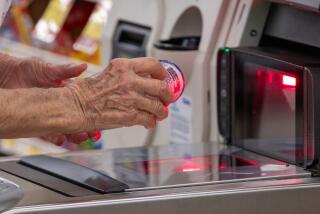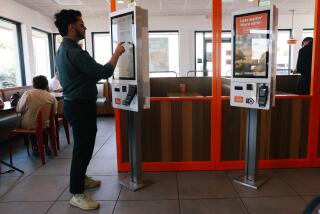EXECUTIVE TRAVEL : Check It Out: Hotels Trying to Do Away With the Front Desk
- Share via
Waiting in line is the bane of business travelers. The last thing most people want to do on a business trip is stand around waiting to check in or out of their hotel.
Hotels have wrestled for years with finding the the most efficient checkout method, and with some success. It’s not unusual anymore for hotel guests to stop by the front desk only when they arrive. Bills are slipped under the door at night, dropped in boxes in the lobby or handled electronically on room television sets.
A growing number of hotels are trying new approaches to shave even more minutes off checkout and cutting out the front-desk routine for check-in.
“The whole thing with business travelers is speed and efficiency,” said Gordon Lambourne, spokesman for Marriott Hotels in Washington.
The latest twist in speedy exits, for example, is the breakfast checkout. Hilton Hotels is test-marketing the idea at the O’Hare Hilton in Chicago and in San Francisco. When guests finish breakfast, they receive not just the food tab, but their hotel bill. They sign and they’re on their way. About 5% of hotel checkouts at the O’Hare Hilton are now done over breakfast, said Bob Dirks, vice president of marketing for hotel operations.
The Grand Hyatt in New York also has an express breakfast checkout, and Marriott is trying the program in Salt Lake City, where the program has been popular, said Lambourne, and the company is looking to expand it to other full-service hotels.
In the meantime, the company has a variation on breakfast checkout at its Courtyard Hotels. When guests check in, they decide whether they will have breakfast. That way, the meal can be pre-billed so it’s already on the tab when they check out, Lambourne said.
While guests are busy checking out over morning coffee, arriving guests might encounter the mobile front desk.
According to the American Hotel and Motel Assn., a few hotels are experimenting with remote check-in using hand-held computer devices. Guests at Marriott’s resort property in Palm Springs, for example, can be checked in anywhere on the property by employees carrying the 2 1/2-pound terminals. The Tropicana in Las Vegas uses a similar hand-held device for remote check-in, and guests taking the shuttle bus from Houston Intercontinental Airport to the Hotel Sofitel Houston can check in on the ride over.
In another variation, Sheraton and Marriott have express check-in programs that allow guests who pre-approve use of their credit cards to give their estimated time of arrival and room preference when they make a reservation. When the guests arrive, they pick up a pre-issued folio with their room assignment and a key off a rack.
Hyatt Hotels Corp., however, is out front in trying to bypass the front desk completely. It just finished installing ATM-like automated check-in machines in 13 of its hotel lobbies. Guests swipe their credit cards through the Touch-and-Go machine and receive a printout with their room number, rate and length of stay. The machine spits out a room “passport” and electronic key, so the guest can head to the room without ever stopping at the front desk. The machine can also be used to speed checkouts. Room charges appear on the screen; the guest touches a button to approve them.
According to a Hyatt survey, 70% of the 224 guests who used the system at the chain’s Chicago and Atlanta test sites said they were “extremely satisfied with the service,” and 94% said they were “extremely or somewhat likely to use the service again.”
Although that was enough of an indicator to make Hyatt expand the program, others in the hospitality industry are more hesitant about the merits of cutting human interaction completely out of registration procedures.
“We’re aware of that technology, but we’re not testing it anywhere right now,” said Lambourne. “Some customers have commented that they feel it’s a bit impersonal.”
Indeed, Marriott is leaning the other way, trying to make guest interactions more personal. One way of doing that is by removing all phones from the front-desk check-in area so guest transactions aren’t interrupted by ringing phones, Lambourne said.
Hilton is also skeptical about using machines to accelerate check-ins. For such systems to work well, all the information has to be perfect, said Dirks. Guests who want to change their room assignment, for example, or who were quoted a different rate when they made the reservation, still end up going through the front desk.
Instead of installing machines, Hilton this month began a program called Zip-In Check-In, which has streamlined the registration process to less than 30 seconds. That compares to the average of 3 minutes and 25 seconds it takes for a traditional registration.
In the standard hotel check-in routine, there is that long minute while the desk clerk searches for your name in the computer (time you spend wondering whether the hotel really has your reservation). Next the clerk gives you the third degree to verify your name, address and credit card. Then there is that mysterious minute while the clerk scans the computer to see whether the hotel does in fact have a room for you. Add another few seconds to explain the ins and outs of using the mini-bar.
Zip-In Check-In, on the other hand, requires only that guests verify their name and credit card number on arrival. The room and key are already issued.
“We understand that quick check-in is an important priority for travelers--whether it pertains to airlines, car rental agencies or hotels,” Dirks said. “And the more frequently one travels, the more critical an issue it becomes.”
Hilton tried automated check-in machines a few years ago, as did a few other hotels, but pulled them out because customers didn’t like them. They may be back someday, however. Dirks and others in the hotel industry recognize that as more people get comfortable with the idea of ticketless travel, the resistance to automated check-in machines will fade.
It’s the same with automated bank teller machines, Dirks said. Ten years ago, people didn’t like them either, but today millions of bank customers use them exclusively.
In defense of its program, Hyatt points out that travelers don’t have to use the machines if they don’t want to. According to Steve Sokal, senior vice president of operations for Hyatt, automated check-in is an option and not designed to replace the front desk.
For people who don’t want to deal with a machine but still want speedy service, Hyatt also offers 1-800 CHECK-IN, an express service that allows guests to check in and receive room assignments by phone.
However, automated machines in more Hyatt hotel lobbies means a growing number of travelers will get their first exposure to self check-in and checkout, which some in the hotel industry think may change consumer expectations about how quickly they can get in and out of their hotel rooms.
If that happens, other hotels are bound to jump in with similar programs.
More to Read
Sign up for The Wild
We’ll help you find the best places to hike, bike and run, as well as the perfect silent spots for meditation and yoga.
You may occasionally receive promotional content from the Los Angeles Times.






